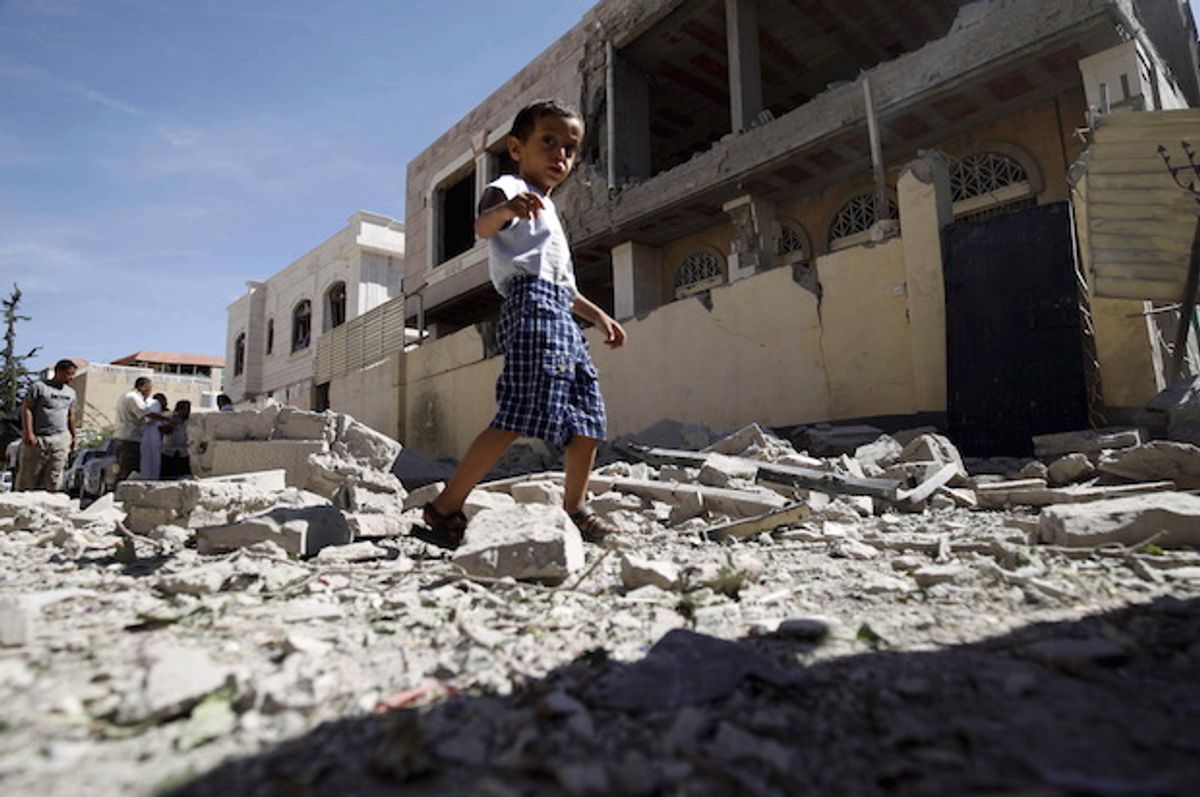For well over a year, war has ravaged Yemen, the poorest country in the Middle East, killing thousands of civilians and creating one of the worst humanitarian disasters in the world, in which 14 million people, more than half of the population, face hunger.
In the past three months, it looked as though there could be a breakthrough in U.N.-backed peace talks. But those talks broke down on Saturday, and the violence immediately resumed.
On Sunday, mere hours after the peace talks ended, the U.S.-backed, Saudi-led coalition launched 30 air strikes throughout Yemen.
Among those killed were at least 18 civilians at a market outside Yemen's capital, Sanaa. Six members of the same family reportedly died in the attack.
Warplanes from the Saudi-led coalition, which has been armed, trained and advised by the U.S., bombed the al-Madeed marketplace in the district of Nehm.
Yemeni pharmacist Sadam al-Othari lost his son. The bomb exploded outside his drugstore, killing his child and a customer, and wounding him.
“They targeted only civilians,” Othari told The New York Times. “There wasn’t a single gunman or military vehicle around.”
After the bombing, “The fighter jets kept hovering overhead, and people were so afraid to help,” he recalled.
Othari's testimony is consistent with past reports of "double-tap" strikes. As Salon previously reported, the coalition has used double- and even triple-tap strikes to bomb rescuers trying to save people killed in earlier strikes, according to Doctors Without Borders.
The attack on the marketplace on Sunday took place near another market in Nehm that was bombed by the coalition in February, killing at least 40 people, as Salon also previously reported.
More than 6,500 Yemenis have been killed in the war, approximately half of whom were civilians, according to the U.N.
Leading human rights groups have accused both the coalition and Houthi rebels of war crimes. The U.N., however, has repeatedly reported that the Saudi-led coalition is responsible for two-thirds of civilian casualties.
Rights groups have also blasted the Saudi-led coalition for dropping widely banned cluster bombs on civilian areas. Amnesty International says these cluster munitions were manufactured in the U.S., U.K. and Brazil.
The U.S. has done more than $100 billion in arms deals with the Saudi regime in the past several years.
American and British military officials are physically in the command room with Saudi bombers, and have access to a list of targets.
The New York Times obtained a copy of a report on Yemen conducted by a panel of experts appointed by U.N. Secretary-General Ban Ki-moon.
This report documents violations of international law, including one instance in which coalition warplanes twice deliberately attacked the same civilian home.
The U.N. report also noted that Abd Rabbuh Mansur Hadi, the U.S.-backed Yemeni president who is widely seen as a puppet of Saudi Arabia, appointed a financier of al-Qaeda as governor of a Yemeni province.
Nayif Salih Salim al-Qaysi is recognized by the U.S. government as a "specially designated global terrorist." He was appointed governor of Baydha province by Hadi in December 2015.

Shares